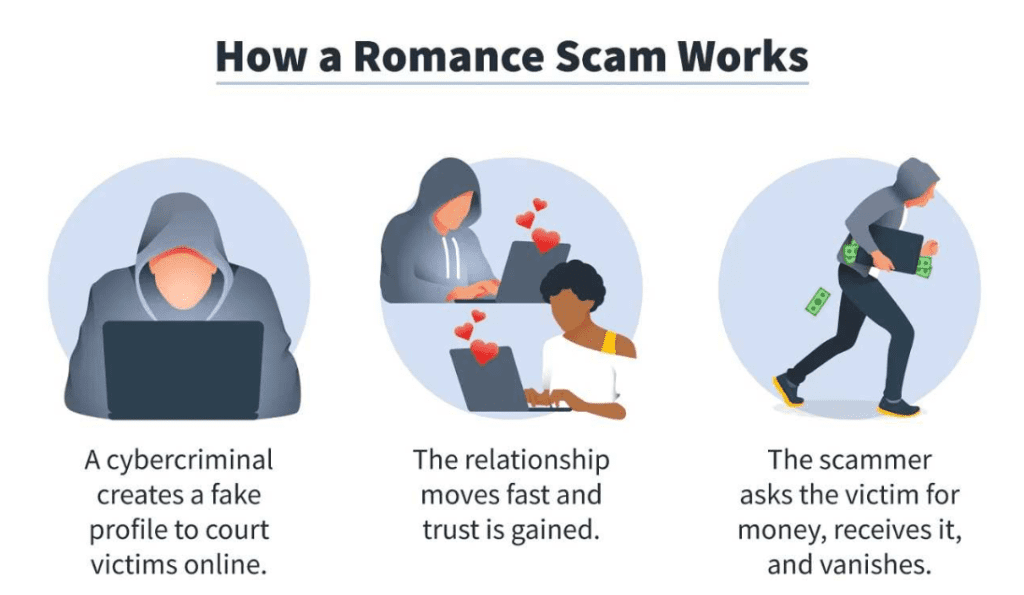Tere are many ways to meet a potential partner on a dating site, whether you’re looking for a casual date or to work a long term relationship.
Despite the positive relationships most people have had with dating apps and dating websites, a small minority have had financial difficulties. To scam people out of their money, criminals are using dating apps under the guise of online anonymity.
How Internet Dating Scam Works
Romance scams are most often conducted on online dating websites, but scammers may reach out to victims on social media or by email as well. In some cases, they have even called their victims. This type of scheme is also called catfishing.
Online scammers often create false personas on social media platforms to lure romance scam victims or others in the United States into sending funds through Western Union. A fake name or impersonation of a trustworthy individual, such as a military personnel, aid worker, or foreign professional, may be used.
In a short time, scammers use a scheme to express intense emotions for you to date them, and they will suggest using a private channel, like email, instant messaging, or phone calls, rather than the Internet. It is not uncommon for them to portray themselves as Australians or residents of a Western country when, in fact, they are living in another country or traveling there.h
They will ask for money, gift cards, credit cards, court documents, or banking information (subtly or directly) once they have obtained your trust. Furthermore, you may be asked to submit personal photographs and videos.
It is also common for dating and romance scammers to be associated with criminal networks abroad, which can put your physical safety at risk. Victims may be lured overseas to potentially dangerous situations, with terrible consequences for them.
An alleged victim might lose a significant amount of money regardless of how the high profile fraud is perpetrated. According to the U.S. Attorney’s Office in San Francisco, the online dating and romance fraud industry has duped billions of victims every year for the past decades. It is rare to recover money sent to scammers, and you can also suffer emotional betrayal from someone you thought you loved.

How a 22 Year Old Tailor was Sentenced for Engaging in Western Union Scam
Kabiru Okeshola, 22, was sentenced to one year imprisonment for presenting himself as a white woman in a Western Union scam in an Ikeja Special Offences Court.
In response to the Economic and Financial Crimes Commission’s (EFCC’s) allegations against Okeshola, Justice Rahman Oshodi sentenced him to one year at the Correctional Service Centre, a Federal Prison in Ikoyi.
Justice Oshodi said he did not doubt that the defendant’s confession was evidence of a scam on an online dating site.
“You have been convicted of possessing fraudulent documents and credit cards through which you obtained 3,000 dollars in violation of Section 320 of the Criminal Laws of Lagos State, 2015. As for the money, you used it to pay your late father’s hospital bill. You claim to be a tailor now and that you have turned a new leaf.”
Federal authorities imposed a one year prison sentence and a fine of N100,000 on the online dating scammer. A forfeiture order was also issued to the Nigerian government, in which the convict’s iPhone 13 Pro and N300,000 bail were forfeited by the convict. A fine of $2,000 must be paid before Oshodi can release the convict to the correctional officers.

The defense counsel argued that the victims had been deceived numerous times in their pursuit of true love, pressing charges against the accused for counts of mail fraud that ultimately led to a sentence in federal prison.
Romance scam victims, who shared a common thread of reported losses, often unknowingly provided their phone numbers and credit card information, becoming targets for fraudulent activities, with some even falling victim to transactions through Western Union.
In South Africa, similar stories of victims of online dating site scams often find themselves targeted by fraudsters who manipulate emotions and trust to exploit individuals seeking companionship, turning what was supposed to be a platform for connection into a space where criminals prey on those looking for genuine relationships.
Online Romance Scams: Working on Avoiding Them
Precautions to take when meeting others through dating services or social media include:
- Verify the identity of the person online, including their name, address, photo, and email address.
- Consult a trusted friend or family member before rushing. Discuss your future steps with a friend or family member. You may be forced to make hasty decisions or isolated from your family and friends by romance scammers. Fraudsters shouldn’t rush you into a decision.
- Do not send any money. Wire transfers, gift cards, or cash reload cards should never be used to send money to an internet love interest. There is no way to get it back.
- If you know some victims or you have sent money previously, press charges and report to family members or file a formal complaint to federal prosecutors.

These Scams Happen Worldwide
In recent years, the U.S. District Court has seen an alarming increase in victims of romance scams who fall prey to criminal acts, with allegations of fraud and deception leading to court documents and imprisonments for convicted individuals. These scams, often perpetrated through social media platforms on victims, involve the misuse of phone numbers and credit cards, leaving a trail of devastated individuals whose plight is documented in police reports and federal prison records. The convict’s phone, a key piece of discovery in the dating site scam, further highlights the sophisticated nature of these scams that have spanned decades.
In a surprising twist, the romance scammer conviction came with a convict’s admission during a series of phone calls, revealing a sinister plot that caught the attention of federal authorities and the Federal Government of Nigeria. The scam, preying on a vulnerable age group, led to the loss of life savings through cunning tactics, as highlighted in federal charges. The victims, seeking true love, found themselves entangled in a love scam that prompted a support group intervention, with the Better Business Bureau cautioning others to be vigilant. For those interested in the details, one can watch CBS News to learn more about this intricate scheme involving money orders and the heart wrenching consequences faced by unsuspecting individuals.
Conclusion
Despite the risks associated with online dating, you shouldn’t give up on it. Make sure you verify the identity of anyone with whom you interact. Keep an eye out for the warning signs of common online dating scams.



